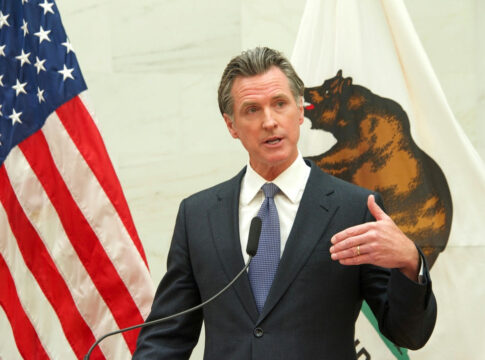California’s latest law enforcement expansion highlights a troubling double standard: while Sacramento touts “collaboration,” state troopers are being deployed in major cities even as constitutional concerns and conservative values are sidelined.
Newsom Deploys State Police: A Shift in California’s Policing Playbook
On August 28, 2025, Governor Gavin Newsom announced the statewide expansion of California Highway Patrol (CHP) crime suppression teams, targeting high-crime areas in Los Angeles, San Diego, Sacramento, the San Francisco Bay Area, the Central Valley, and the Inland Empire. The move builds on prior deployments in cities like Oakland and Bakersfield, where officials claim sharp reductions in violent and property crime. Newsom frames this initiative as a “collaborative” partnership with local law enforcement, but for many conservatives, the optics of increased state police presence raise red flags about government overreach and the dilution of local authority.
https://www.youtube.com/watch?v=IbSCHItWbYM
State officials point to pilot programs in 2024 that allegedly delivered double-digit drops in homicides and robberies. For instance, Los Angeles saw reported homicides fall 17% and overall violent crime drop 12.5% across California’s largest cities. Yet, these “data-driven” results are presented without substantial independent verification, relying largely on government statements and friendly media coverage. Many on the right remember past promises of safety that failed to materialize, and question whether these new deployments truly address the root causes of crime or simply create headlines for political gain as the Trump administration’s decisive federal interventions are contrasted with Newsom’s “partnership” model.
State-Local “Partnerships” or Power Grab?
Newsom is quick to highlight that this approach is distinct from President Trump’s strategy, which empowered federal agencies and, when necessary, the National Guard to restore order in cities plagued by lawlessness. California’s model, in contrast, relies on state-local “collaboration” and intelligence-led policing. However, critics argue that this is merely a rebranding of top-down control that still sidelines local priorities and community voices. The CHP acts as a “force multiplier,” but operational decisions remain driven by state officials and political calculations in Sacramento, rather than the needs of neighborhoods or the will of local voters.
There’s also the question of accountability. While Newsom touts the “success” of the pilot programs, details on oversight, transparency, and how these teams interact with local police remain vague. Recent expansions into new regions have led to concerns that local police departments could become increasingly dependent on state resources, eroding the autonomy of community-based law enforcement and undermining the principles of federalism that conservatives hold dear. The distinction between “assistance” and “takeover” is blurring, and the implications for constitutional governance should not be ignored.
Political Motivations and the Erosion of Conservative Values
The timing and framing of Newsom’s announcement cannot be separated from the broader political landscape. The initiative arrives as California positions itself in opposition to the Trump administration’s straightforward, constitutionally grounded approach to public safety. Newsom’s rhetoric draws stark contrasts with federal action, suggesting that “partnerships” are the antidote to Washington’s “unilateral” measures. Yet, for many conservatives, this rings hollow given California’s record of progressive policies that have contributed to rising crime, homelessness, and fiscal mismanagement.
Moreover, the expansion of state law enforcement power—under the guise of “data-driven” policing—should raise alarms for anyone who values limited government and civil liberties. The ambiguous nature of “high-visibility patrols” and the lack of robust independent oversight create opportunities for abuse and mission creep. As government agencies amass more data and deploy more officers, the risk of infringing on the rights of law-abiding citizens increases, especially when checks and balances are weak or absent.
Long-Term Impact: Real Results or More Bureaucracy?
Proponents claim that the expansion of CHP teams will bring lasting reductions in violent and property crime, improve relationships between state and local law enforcement, and serve as a model for other states. Early results in pilot cities are lauded as proof of concept, with state officials citing reductions in crime as evidence of success. However, the lack of independent analysis and the political nature of the rollout leave many unanswered questions. Will these teams actually improve public safety, or are they another layer of bureaucracy that diverts attention from real solutions—like empowering families, securing borders, and upholding the Constitution?
For conservatives, vigilance is required whenever government power expands, even under the banner of crime-fighting. The Constitution’s protections, local control, and the rights of law-abiding citizens must remain at the forefront of any public safety initiative. Californians deserve genuine solutions—not just more state intervention and rhetoric from politicians seeking to score points in national debates. As this new phase of policing unfolds, the imperative is clear: defend conservative values, demand transparency, and hold all leaders accountable—regardless of political affiliation.
Sources:
California Highway Patrol crime suppression teams head to Los Angeles, San Bernardino
Newsom announces CHP teams to be deployed across California
Newsom expands CHP crime suppression statewide, but what about the Central Coast?



Today’s Focus: her latest blog
Site web fonctionnel de 1xbet 1xbet apk